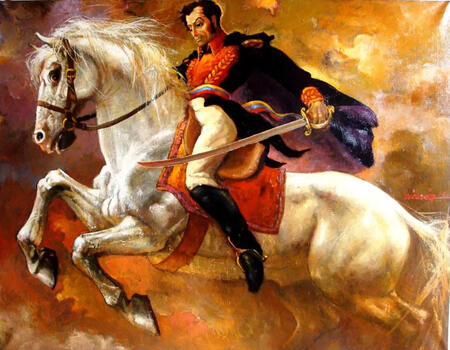Independence of Latin America
The Spark of Latin American Liberty: A Fire Ignited by Colonial Oppression, Economic Inequality, and Enlightenment Ideals.

El Libertador
Simon Bolivar
Simon Bolivar played a pivotal role in Latin America gaining independence, he commanded many successful military efforts against Spanish troops, freeing regions that are now included in Colombia, Venezuela, Ecuador, Peru, and Bolivia.
He envisioned a union of Latin nations working together and thriving.
Simón Bolívar was born on July 24, 1783, in Caracas, Venezuela, into a wealthy Creole family. Bolivar's family belonged to the elite class of the Spanish colonial period, but Bolivar was exposed to Enlightenment ideas from an early age. He was educated by private tutors and was later sent to Europe to complete his studies. While in Europe, Bolívar was inspired by the French Revolution and the American Revolution. As he learned more about these revolutions, he began to question Spanish colonial rule. Bolivar returned to Venezuela in 1810 and joined the independence movement, becoming a leader of the revolutionary forces.
While Bolívar's dream of a united South America was never fully realized, his enduring legacy as a champion of independence and a visionary leader persists in Latin America. He is recognized as one of the most significant figures in the region's history. His ideas of unity, self-government, and social justice continue to inspire people today. However, his legacy is also complex and contested, as some argue that his actions ultimately led to political instability and fragmentation in the region. Nevertheless, his crucial role in the struggle for Latin American independence and his representation of the region's aspirations for freedom and self-determination remain unquestionable.Foote, Nicola. Sources for Latin America in the Modern World 01 June 2018
Freedom
Key Factors Driving Latin America to Independence
Foote, Nicola. Sources for Latin America in the Modern World 01 June 2018
Internal GrievancesA rigid social hierarchy based on race and ethnicity existed, with Europeans at the top and Indigenous people and enslaved Africans at the bottom, which led to limited opportunities for social advancement, particularly for lower-class individuals and people of color. Creoles were often discriminated against and denied high-ranking positions. People of color, including Indigenous peoples and enslaved Africans, were subjected to systemic discrimination and inequality. They were denied basic rights, access to education, and opportunities for social and economic advancement. This led to widespread resentment and a desire for change.External GrievancesThe colonial system was designed to enrich the Spanish and Portuguese crowns and a small elite at the expense of the colonies. The colonies were exploited for their resources, such as precious metals, agricultural products, and raw materials. The Spanish and Portuguese put strict mercantilism policies, limiting trade and economic opportunities for Latin American colonies. The colonial governments imposed heavy taxes on the colonies, draining their wealth and stifling economic growth. These taxes often funded lavish projects in the mother countries, leaving little for investment in the colonies themselves.
Spanish America
Independence in Spanish America was achieved through a series of long and bloody wars against the Spanish colonial power. Leaders like Simón Bolívar and José de San Martín played crucial roles in these military campaigns. Latin American revolutionaries were inspired by Enlightenment ideals of liberty, equality, and popular sovereignty.Brazil
Brazil's independence was achieved through a relatively peaceful process compared to other nations in the region. While there were some skirmishes and uprisings in Brazil, the process was largely non-violent and negotiated. This was due in part to the fact that Brazil was a colony of Portugal, which was a more liberal and tolerant colonial power than Spain.
Spanish America and Brazil
The Independence Movements of Spanish America and Brazil
Foote, Nicola. Sources for Latin America in the Modern World 01 June 2018